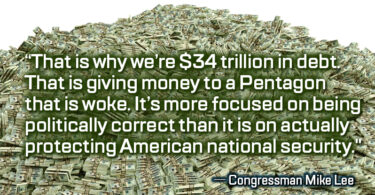Yet the Navy used it as justification for DEI in their Task Force One report
By Tristan Justice | The Federalist
A report out last month shows that studies from the global consulting firm McKinsey & Company showing a correlation between Diversity, Equity, and Inclusion (DEI) programs and significant profits were based on junk research.
A 30-page paper published in Econ Journal Watch found that studies conducted by the consulting giant in 2015, 2018, 2020, and 2023 could not be verified to find significant results supporting conclusions that favor corporate DEI regimes.
“Our results indicated that despite the imprimatur often given to McKinsey’s 2015, 2018, 2020, and 2023 studies,” researchers concluded, “McKinsey’s studies neither conceptually (in terms of the correct definition of causality) nor empirically (in terms of their set of large US public firms) support the argument that large US public firms can expect on average to deliver improved financial performance if they increase the racial/ethnic diversity of their executives.”
In other words, McKinsey’s studies touting diversity are not reliable.
According to the pair of researchers who reviewed McKinsey’s work, “caution is warranted” when considering the recommendations from the firm to support DEI initiatives because results could not be replicated.
“The structure of McKinsey’s tests,” they added, point in “the default direction of causality,” showing “better firm financial performance causes firms to diversify the racial/ethnic composition of their executives, not the reverse.”
Despite the flaws in McKinsey’s work, the U.S. military cited the 2015 diversity report from the consulting company in 2021.
In the Navy’s “Task Force One” final report espousing the need to diversify the force, the authors wrote that “gender-diverse organizations are 15 percent more likely to outperform other organizations and diverse organizations are 35 percent more likely to outperform their non-diverse counterparts.”
“When compared to 2018 U.S. Census population data, our enlisted force has greater racial and ethnic diversity than our society, however, is under represented from a gender perspective,” the Navy reported. “Our officer corps remains overwhelmingly white and male and, except for Asian representation, is not representative of the U.S. today.”
Elaine Donnelly, the president of the Center for Military Readiness, outlined the military’s recruiting woes for The Federalist last week as the Pentagon prioritizes far-left DEI initiatives.
“Chronic recruiting shortages are forcing the Army to cut 16,500 occupational positions, most of them vacant,” she wrote. “The Air Force has proposed a reduction of 8,000 troops after missing recruiting goals for the first time in over 20 years. The Navy is short 9,000 sailors, forcing longer deployments for others.
She explained, “Race-conscious ‘diversity, equity, and inclusion’ (DEI) policies are making personnel shortages worse.”
“Minority recruitment has remained steady or increased, which is fine,” Donnelly wrote, “but a steep decline in white recruits almost entirely accounts for the ongoing recruiting crisis.”
First published in The Federalist
Task Force One Navy Final Report (pdf)
Here's why this is such a big deal:
These McKinsey studies were the gold standard in the DEI industry.
Nearly every major institution in America cited them to justify their DEI programs.
Turns out, it was all a lie. The studies were false.
Let's look at a few examples…???? https://t.co/47hUSUp2Ij
— America 2100 (@America_2100) April 2, 2024
The More Americans Know About DEI, the More They Hate It (Rasmussen Report, March 2024)
Major corporations are pushing to implement DEI (“diversity, equity and inclusion”) policies, and familiarity breeds contempt.
The latest Rasmussen Reports national telephone and online survey finds that just 25% of American Adults think diversity, equity, and inclusion programs make companies better.
(To see survey question wording, click here.)
According to Wikipedia, DEI policies seek to promote “the fair treatment and full participation of all people,” particularly groups “who have historically been underrepresented or subject to discrimination” on the basis of identity or disability.
Sixty-four percent (64%) of those surveyed are familiar with DEI, including those who believe diversity, equity and inclusion programs are making companies better, while 34% think DEI is making companies worse.
Twenty-five percent (25% say) DEI programs don’t make much difference and 16% are not sure.
32% who are Very Familiar with DEI. Among Americans who are Very Familiar with DEI, 51% say such policies are making companies worse. . . . . (read more, subscription required)








Leave a Comment